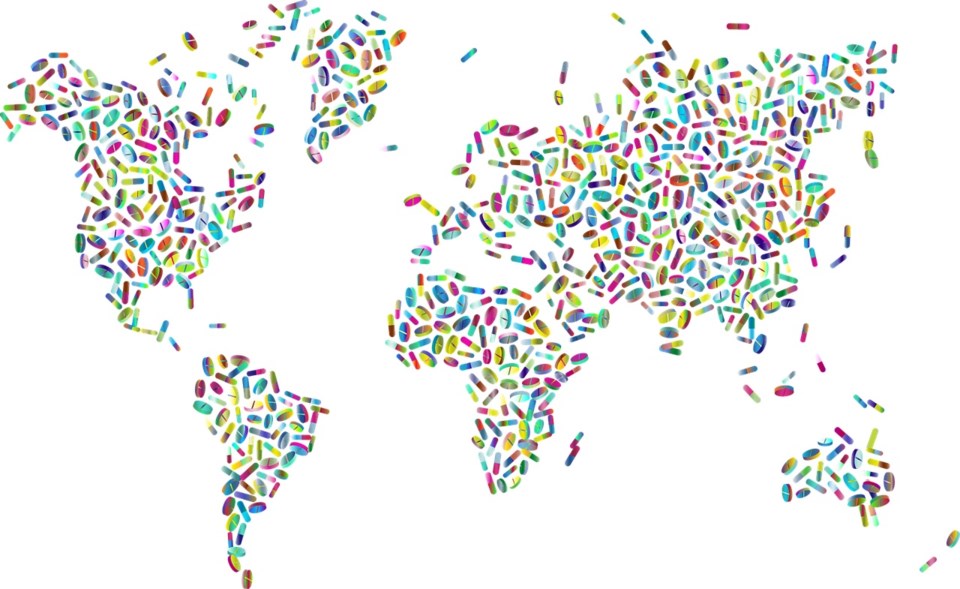Dear Editor,
I've been a member of the Tri-Cities Community Action Team since 2016 when the toxic drug crisis was declared a public health emergency in B.C.
On April 14, my team and I will plant 1,500 purple flags at Lafarge Lake to honour and remember lives lost and create public awareness of this continuing crisis.
Over the last nine years, I've heard many heartbreaking stories from families who have lost loved ones.
I've also learned a lot from people struggling with substance use, as well as the health-care professionals and family members who care for them and worry for their safety.
I wrote this poem in response:
People of the World — Wake Up to the Toxic Drug Crisis!
The opioid crisis is a worldwide emergency
That needs to be treated with far greater urgency
Graphs display death rates with alarming increases
It’s a troublesome puzzle with numerous pieces
A toxic drug epidemic doesn’t discriminate,
Between rich folks and poor, there’s no single determinate
With a human catastrophe affecting millions of lives
We must prioritize solving it before countless more die
How can we manage such a challenging task?
Finding solutions that work is a formidable ask
We must seek out and examine all the root causes
Disconnection and anguish, body pain and trauma
Nobody chooses a life of addiction
Harrowing events often change life’s direction
Taking people to places we can’t imagine
To escape from torment too deep to fathom
People use substances to mask mental trauma
From childhood abuse or conditions they’re born with
Physical pain from work injuries and sports
May lead to the misuse of drugs of all sorts
Shame on Big Pharma for their part in this mess
And for those who make money off human distress
They’d be wise to step up and start work on redress
Because karma will dish out as good as it gets
Some recovery programs promote prayer and religion
These should not be required in a treatment equation
Twelve steps and faith are for many a dissuasion
From facilities and programs that could otherwise aid them
Faith works for some, but not all are believers
Should they have to be hypocrites — praying to Jesus?
Lay down the holy books, put religion on the shelf
Ask meaningful questions about how best to help
What if we invited more players to the table
People with a focus on recovery, not jail cells?
We know putting sick people in prison won’t work
Those with lived experience shouldn’t be overlooked
Folks in recovery have wrestled with pain
With treatment, they’ve discovered there’s so much to gain
Some generous souls have the courage to come back
From personal depths to get others on track
Many have experienced withdrawal and cravings
Been homeless and hungry without prospects or savings
They can give out tough love as their journey’s familiar
And are valuable mentors for those going through similar
Pay attention to workers in shelters and on streets
Those on the front lines who understand needs
People are people, not numbers and stats
Have the sense and compassion to meet them where they’re at
Listening with interest to opinions and thoughts
And considering all options leads to programs that work
Curiosity is a superpower well-known to the wise
More questions and less talking would help open eyes
And let’s respect science and use legitimate stats
Reject bias and conjecture and stick with the facts
Evidence-based research is what smart people use
For policy decisions where the impact is huge
In some other countries, success has been seen
Why not study their methods to see what we can glean?
We must switch focus from punishment to care
And consider testing programs that have worked well elsewhere
Substance Use Disorder is not a personal choice
A moral failing to be scorned by the media’s harsh voice
Stop penalizing those who treat their suffering with drugs
Save the jail time for dealers and underworld thugs
Giving fines for drug use belongs in the past.
The benefits of supervised consumption are vast
Free opioid treatment does not prolong addiction
It even saves society money in the long run
On the path to recovery, people need help
To find safe, low-cost homes, effective treatment and work
They need clean, free medication, support and connection
Experience-based guidance and non-judgmental direction
And treatment facilities with no stay-length restrictions
Addiction could happen to you or to me
One nasty curveball, and where would we be?
And how would we hope to be treated by others
As worthless criminals or like sisters and brothers?
Toxic drugs are killing our family and friends
If we fail to take action — where will this end?
We must educate ourselves and start conversations
On behalf of our loved ones and the health of our nations
Thanks to all those who have generous hearts
Good intentions are always a great place to start
Reach out and help — don’t turn a blind eye
Because there but for good fortune,
Go you — and go I.
--Gill McCulloch, Coquitlam



